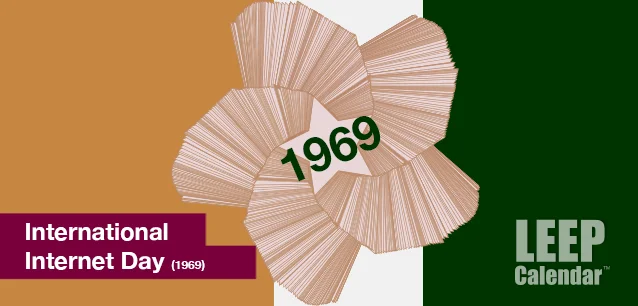 AD
AD
Today is: January 04
Scroll to explore events active on this date.
Additional Events on LEEP
LEEP INK FEATURES

Part II
There are several unique focuses for 2025. I covered the first 12 in Part One. The following are the rest I have discovered for this year. As with all issues of LEEP Ink, the following descriptions are a...

January—It is a New Year!
We've arrived at another new year; the older I get, the more frequently they come. When I was younger, years seemed to take a long time to pass. Now, they're just a blip—here and gone. For ma...

2025 is the Year of...
21 Themes and 'Year of' Events for 2025 PART ONE, THE FIRST 12 Every year, various organizations announce the theme for the year. These themes can focus on causes, such as aesthetics and color tre...
About International Internet Day
Finance & Banking , Science & Math
Ends: Oct 29, 2023
DESCRIPTION:
International Internet Day marks the invention of the Internet in 1969 by Leonard Kleinrock at UCLA. It was called ARPANET.
The original idea came from MIT's JCR Licklider in 1962 via a concept he called the "Galactic Network." A year earlier, Kleinrock published his first paper on packet switching theory, which replaces circuits with information packets. The third piece of the puzzle is the ability of one computer to speak to another. This piece came in 1965 when Lawrence G. Roberts and Thomas Merrill connected two computers, one in California and the other in Massachusetts, over an ordinary telephone line, enabling the two computers to work together. Researchers at defense contractor RAND and NPL were also coming to similar conclusions.
The first Internet included four computers in four different locations. By 1972, the first application was introduced—electronic mail.
The word Internet comes from a packet radio program that formed the basis for networking called "interneting," coined in 1972 by Bob Kahn of DARPA.
The impact of the Internet on shaping society and how we do business, share ideas, and disseminate information was unfathomable in 1969. Ask anyone born after 1990 to imagine their life without the Internet. Likely, they cannot.
Those of us (like this writer) born in the 1960s remember life before the Internet. My first experience with it was in college, researching term papers. The library had an intranet that allowed me to do weeks of research within hours through search. That was 1990. I'd have to wait a few years for the commercial applications to catch up with the institutional application.
In 1995, I had the privilege of working for the fifth radio station globally to go online. Even in that early time of the World Wide Web, we tried to convince retailers to put their products online for purchase, use the web for advertising, and rely on email to deliver products, including digital magazines, letters, and announcements. Businesses weren't listening then (and Jeff Bezos was just getting started). Time would show e-commerce and digital media to be a wise move.
By 2004, with web 2.0, social media was invented. With the 2007 introduction of the smartphone, the Internet went mobile.
Today, we don't go to video stores for movies; rather, we stream. We don't use landlines to make phone calls. Instead, we video chat, text, delve into cellular and use VoIP. We shop by keyword instead of stepping into stores. Our music comes from online depositories, and even our books and newspapers are delivered seamlessly to our phones and tablets. Retailers seem to know what you want to buy before you know you want to buy it, and a President of the United States can bypass press briefings and rally an insurrection 280 characters at a time.
Okay, not everything about the Internet is ideal, but life is certainly a lot different than it was pre-internet. Most of the world's people cannot fathom a world without the Internet.
Happy Birthday, Internet!
VIDEOS
Currently, this event does not have supporting videos.
SUPPORTING DOCUMENTS
Currently, this event does not have supporting documents.
ADDITIONAL IMAGES
Currently, this event does not have supporting images.
Where would you like to go now?
 AD
AD


/footer-logo.svg)
